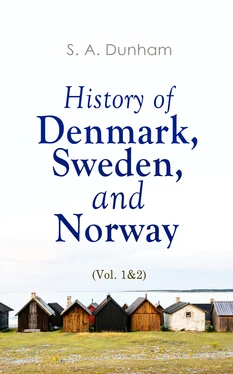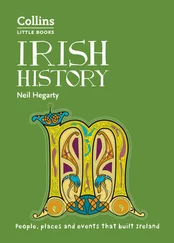According to Saxo, this personage was a mortal, king of the Hellespont, who laid claim to the honours of divinity, and was actually worshipped by most of Europe. His profound knowledge of magic procured him the character. His ordinary residence was Byzantium; but he held Upsal, which he frequently visited, in much esteem. Anxious to testify their respect for this new deity, the kings of the north cast a golden statue in his honour, adorned it with bracelets and other costly ornaments, and sent it to Byzantium. It was received by Odin with great joy, and placed in the temple of the gods. But Frigga, the wife of Odin, whom Saxo judges to be quite worthy of such a husband, stript the statue of its ornaments to adorn herself. The incensed deity hung the mechanics who acted by her orders; and, for greater security, placed the image on a high pedestal, and, by his wonderful art, rendered it vocal to human touch. But when was female vanity cured? To secure the aid of a domestic of the temple, Frigga did not hesitate to grant him the last favour; and, by his aid, the gold being again abstracted, again adorned her person. This twofold injury was too much for a god to withstand; and Odin left the country for a season, until the public discourse, like a nine days’ wonder, had evaporated itself into empty air. During his absence, several persons—probably priests of his own temple—arrogated to themselves the attributes of divinity. These, on his return, he forced not only to lay down their borrowed honours, but to flee from the country. Among them, one is mentioned whose case affords a curious illustration of popular superstition. Mitothin was a great magician, and had long enjoyed the favour of the gods. But they were incensed with his impiety, while he no longer paid them the slightest homage. On the return of Odin he fled to Fionia, and was killed by the inhabitants. In his tomb, however, he was amply revenged: he introduced into the whole region various kinds of plague; he destroyed multitudes of the inhabitants; until they, one day, opened his sepulchre, exhumed his body, cut off his head, and drove a stake through the corpse: then the mysterious visitation was at an end. He is, probably, the first vampire on record. [29]
The account of Snorro Sturleson, who followed Norwegian, not Danish authorities, differs in many respects from the preceding. He informs us that the seat of Odin’s power, both temporal and spiritual, was Asgard, a place of extraordinary sanctity east of the Tanais. Over the temple were twelve pontiffs, whose duty was the twofold one of sacrificing and administering the laws: they were called driar or drottnar —lords—and were held in much veneration. At the head of this theocratic state was Odin, who was at perpetual war with his neighbours, and on whose arms success always shone. So great, indeed, was this success, that he was called the father of victory. When he sent out his generals on any expedition, he was accustomed to lay his hands on their heads and predict a fortunate issue to the undertaking. Hence the peculiar veneration attached to his character. His followers regarded him as a god; in dangers and perils of any kind—on land, on deep—whether he were present or absent—they invoked his name, and ascribed all their prosperity to him. His expeditions, even to remote countries, were frequent; and during his absence the sovereignty was administered by his two brothers. The Vanir, who are said to have been his neighbours, he so harassed, that they sued for peace: the conditions were framed, and hostages given for their punctual observance. Niord the Rich, and Freyr his son, were surrendered by the Vanir; Haenir and Mimir by the Asser. In a short time, however, the former perceiving that their confidence was abused by the hostages of Odin, cut off the head of Mimir and sent it to Asgard. By his magic art, Odin so enchanted the head that it became his oracle: it conversed with him whenever he pleased, and acquainted him with many hidden things, both of nature and of fate. Niord and Freyr, he won over to his own interests by investing them with the dignity of the priesthood, and, consequently, with some portion of divinity. The same honours were conferred on Freya, the sister of Freyr who taught the Asser the magic which she had learned among her countrymen, the Vanir.—At length, the victorious arms of the Romans approached the kingdom of Asheim; and Odin, learning from the fates that settlements were provided for him in the north of Europe, left his two brothers with the sovereignty of Asheim, and, attended by a great multitude of followers, advanced into the west. In his progress through Germany he placed his sons over the states which his arms reduced. He then passed northward, and fixed his seat at Odensey (Odin’s Island). From thence he despatched Gefio, one of his prophetesses, to make proselytes in the neighbouring regions; and she was well received by both Gylfe, king of Sweden, and by the Jutes. They did not, indeed, embrace her religious faith; but they gave her lands and revered her as one of the chief supports of magic. In the sequel she married Skiold, the son of Odin, who reigned over the Danish islands. Odin, himself, advanced into Sweden, and forced Gylfe to cede to him the eastern part of that kingdom. He established his seat at Sigtuna, where he caused temples to be erected and sacrifices to be offered. Thence his authority and his worship were diffused throughout Germany and Scandinavia. [30]
The qualities of this extraordinary man are the favourite theme of the Swedish and Norwegian chroniclers. He was the father, says Snorro, of all the arts in northern Europe. He could change his looks at pleasure. To his friends he was exceedingly beautiful, and their hilarity he was always desirous to promote. To his enemies, especially in battle, he seemed a demon: the countenance which before was so exquisitely attractive, now inspired terror and death. Such was his eloquence that he captivated all who heard him, and he always spoke in verse: hence he was called the artificer of song; and from him northern poetry had its origin. In imitation of him all the magicians of Scandinavia couched their incantations in metrical numbers: indeed, he had so warranted the example, that the most potent runes would, in popular opinion, have lost their efficiency had they been in prose. By these verses Odin could, in the hour of battle, strike his enemies with blindness, with deafness, or with panic fear, and render their sharpest weapons blunt as twigs. By the same means he could render his own men as furious wolves, strong as bears or bulls, and invulnerable to steel or fire. Often, while his body lay supine, he would assume another form—that of fish, serpent, or wild beast—and in a moment hasten to the remotest parts. At his mere command, fire ceased to burn, the wind to blow, and the sea to rage; and the elements moved in what direction he pleased. He had a wonderful ship, called Skidbladner, which he could fold up like a handkerchief, yet which carried him through the most dangerous seas.—According to the latter Edda, this ship was built by the dwarfs—probably the Lapps, so called to distinguish them from the Jutish giants—who were rather the allies than the enemies of the gods. Small as this vessel was—since it could be easily carried in a pocket or in the palm of the hand—yet, when expanded, “all the gods, completely armed, could sit in it.” And it had another wonderful property: the moment the sails were unfurled, a favourable wind was sure to rise, and bear the passengers wherever they wished to go. Then there was the embalmed head of Mimir, which acquainted him with whatever he wished to know. And he had two ravens which he endowed with the gift of speech, and which, continually flying over the earth, brought him intelligence of everything that happened. Sometimes he summoned the dead from their graves: hence he was called the Lord of the Tombs. He was profoundly versed in the art called seid —the art which foretold events, which induced or removed death, sickness, pain, and all the ills of mankind. He knew all the treasures concealed in the bowels of the earth, the incantations which could open them, the laws which governed the fairy inhabitants of the mountains, the stream, and the rock: their motions were regulated by his mere word. Hence his wide-spread fame; hence the confidence of his followers, and the terror of his enemies. Many were the arts which he taught his pontiffs, by which they were rendered nearly as wise and powerful as himself. He and his twelve pontiffs were worshipped as gods. The laws which he introduced were those anciently adopted by the Asser. He commanded the corpses of the dead to be consumed on the funeral pile, and with them the most valuable things of the deceased, affirming that whatever was thus consumed would accompany the hero to Valhalla, and still administer to his wants. The ashes of men in general were to be cast into the sea, or buried in the earth: only some of eminent dignity or merit were to have tombs erected in their honour. The first great sacrifice he ordered to be solemnised on the approach of winter, as a thanksgiving for the gifts of the year; the second, in mid-winter, for another propitious season; the third, in summer, for victory over all enemies. On every head a tax was laid, and the produce was expended in the defence of the kingdom, in the sustentation of the temples, and in public sacrifices. [31]
Читать дальше












